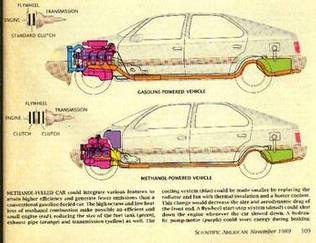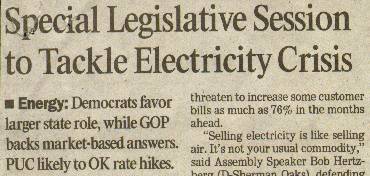 
USA ヘンプ・ミュージアム
 館長から皆さまへ
館長から皆さまへ ヘンプの歴史
ヘンプの歴史 ヘンプと農業
ヘンプと農業 ヘンプの医療と健康
ヘンプの医療と健康 ヘンプ食品
ヘンプ食品 ヘンプ織物
ヘンプ織物 ヘンプ縄と糸
ヘンプ縄と糸 ヘンプパルプ紙
ヘンプパルプ紙 ヘンプ建材
ヘンプ建材  ヘンプ燃料
ヘンプ燃料 ヘンプ・バイオマス燃料
ヘンプ・バイオマス燃料 バイオマス燃料 vs 化石燃料
バイオマス燃料 vs 化石燃料 エネルギー政策提言
エネルギー政策提言 書簡
書簡 関連図書
関連図書  ヘンプ原料
ヘンプ原料 ヘンプ溶剤
ヘンプ溶剤 ヘンプ・プラスチック
ヘンプ・プラスチック ヘンプと環境
ヘンプと環境 ヘンプと娯楽と精神世界
ヘンプと娯楽と精神世界 ヘンプと法律
ヘンプと法律 ヘンプと政治
ヘンプと政治 ヘンプ貢献者
ヘンプ貢献者 ミュージアム図書館
ミュージアム図書館 Topに戻る
Topに戻る |
|
RE: Ten years ago I went to the California Energy Commission and urged them to consider hemp for fuel. In agricultural terms that is ten seasons wasted. But I want to make it clear to Governor Davis and the people of California that we really have the power to act on hemp. The United States Supreme Court ruled in United States v. Butler, 297 U.S. I., 1936 (emphasis mine): "...another principle embedded in our Constitution prohibits the enforcement of the Agricultural Adjustment Act. The act invades the reserved rights of the states. It is a statutory plan to regulate and control agricultural production, a matter beyond the powers delegated to the federal government. The tax, the appropriation of the funds raised, and the direction for their disbursement, are but parts of the plan. They are but means to an unconstitutional end. From the accepted doctrine that the United States is a government of delegated powers, it follows that those not expressly granted, or reasonably to be implied from as such are conferred, are reserved to the states or to the people. To forestall any suggestion to the contrary, the Tenth Amendment was adopted. The same proposition, otherwise stated, is that powers not granted are prohibited. None to regulate agricultural production is given, and therefore legislation by Congress for that purpose is forbidden. It is an established principle that the attainment of a prohibited end may not be accomplished under the pretext of the exertion of powers which are granted... The power of taxation, which is expressly granted, may, of course, be adopted as a means to carry into operation another power also expressly granted. But resort to the taxing power to effectuate an end which is not legitimate, not within the scope of the Constitution, is obviously inadmissible." The U.N. Single Convention on Narcotic Drugs, 1961, (Article 28), exempts industrial hemp from prohibition. This convention is subject to the United States Constitutional limitations above (Article 36), which places the ball squarely in the court of Governor Davis and the California Legislature. Why can't the California farmers grow hemp as Canadian farmers now do? How can we not allow this now? The advantages of hemp for fuel are to numerous to explain in detail, but I'll list a number here. Hemp reverses the greenhouse effect by absorbing atmospheric carbon, and it also saves forests to act as a carbon sink. Hemp has much less water than wood chips and burns more efficiently. Hemp could be pelletized and stored in our national energy reserves. Hemp keeps money for fuel at home with the farmer who spends it locally. Hemp is a basic carbon resource like fossil fuel and can do all the fossil fuel tasks, without spills, without acid rain, without the greenhouse effect, without nuclear wastes, and without being held captive by groups like OPEC. In a recent article by two nuclear advocates, "State's Energy Problem...",Jan. 3, 2001, they failed to even mention biomass as a possible alternative fuel for the U.S. Why? Because the only way agricultural biomass crops will produce enough fuel is with hemp. We will do it, why not now?
Richard M. Davis,
RE: The Supreme Court ruled in Butler v. United States, 1935, that the U.S. Congress was forbidden by the Constitution from controlling agricultural production by the Tenth Amendment, freeing California to take the lead in biomass production with hemp. Why wait? According to EPA scientists a change to alcohol or synthetic gasoline from biomass could take as little as two years. Call Governor Davis or the California Energy Commission and complain.
Richard M. Davis,
Commentary: Mr. Moore says the battle for America's forests was fought 100 years ago, but failed to state the fact that sustainable forestry does not exist today and has not existed for the past 100 years. U.S. Dept. of Agricultural Bulletin 404, 1916, warned of the pressure on our forests from paper production alone. And we now have four times the population of 100 years ago. Mr. Moore makes this speech on trees and wood: "But now, it is so trendy to be opposed to cutting trees that many people find it possible to ignore the absolute necessity of using wood in their everyday lives. Many seem willing to forget that wood is, without question, the most renewable and environmentally friendly of all materials used to build our civilization. Wood is the material embodiment of solar energy, created by photosynthesis in a factory called the forest, and whether we like it or not, wood can only be obtained from trees." This speech is misleading and its conclusion false. Mr. Moore should read Bulletin 404. It clearly states that four times as much wood can be obtained from a woody herbaceous shrub called hemp than from any tree. And I'm sitting here looking at a sample of medium density fiberboard from hemp that is stronger than that from trees and typing on a computer that could be made from hemp plastic. Hemp fuels could replace fossil fuels. And hemp can be grown on a "factory" called the family farm. Forests are not factories, they are ecosystems, full of natural relationships of life that are destroyed by logging. Wood may be a necessity of everyday life, but so are living trees. And living trees and using hemp and other plant sources for wood is the way to reverse the greenhouse gas buildup, because all plants absorb CO2 and give off oxygen. Now you know, Mr. Moore, which wood (hemp) is, without question, the most renewable and environmentally friendly, which wood (hemp) is the embodiment of solar energy, whether we like it or not. For years we have tried to get the major environmental groups to acknowledge and work for hemp -Greenpeace, the Sierra Club. Now you know, Mr. Moore. Now Greenspirit knows. What are you going to do about it? The farmers would love to hear what it is.
Richard M. Davis,
http://hempmuseum.org |


